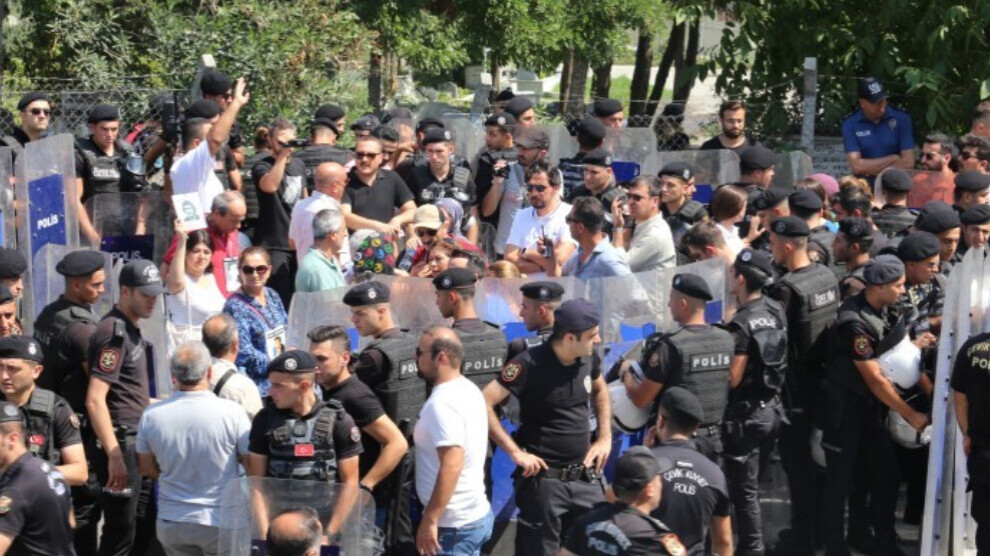13 detained as police attack Saturday Mothers in a cemetery in Istanbul
Saturday Mothers were attacked by the Turkish police in the Cemetery of the Nameless in Istanbul. 13 people were taken into custody.
Saturday Mothers were attacked by the Turkish police in the Cemetery of the Nameless in Istanbul. 13 people were taken into custody.

The Saturday Mothers and Human Rights Association (IHD) Commission Against Disappearance in Custody met in Istanbul to make a statement to mark August 30, International Day against Enforced Disappearance.
The human rights defenders and relatives of disappeared people gathered at Istanbul’s Altınşehir Cemetery of the Nameless where the graves of Hasan Ocak and Rıdvan Karakoç, victims of disappearance in state custody, are located.
The group was denied the right to assembly and attacked by the police, to which they responded by raising the photos of the disappeared and chanting the slogan “human honor will prevail against torture”.
HDP deputy Musa Piroğlu, who remained outside of the police blockade, was denied access to the crowd and moved away from the area by the police.
Responding to the police obstruction, Piroğlu said, “What you are doing is against human dignity and humanity. You are preventing a member of the parliament from speaking.”
After keeping the group under siege for a long while, police took 13 people into custody by use of force.
The detainees include IHD Istanbul Branch Chairperson Gülseren Yoleri and relatives of the disappeared; Maside Ocak, Hüseyin Ocak, Ali Ocak, Besna Tosun, Hanım Tosun, Hüseyin Aygül, Hasan Karakoç, Hanife Yıldız, Ferit Barut.
SATURDAY MOTHERS
Since 1995, the Istanbul Saturday Mothers, like the Argentinian "Madres de la Plaza de Mayo", have held weekly sit-ins in Istanbul with pictures of their relatives to protest against their "disappearance" in state custody and to demand information about their whereabouts. Between 1999 and 2009, the Saturday Mothers had to suspend their weekly sit-ins as police regularly broke up the gatherings. On 25 August 2018, the initiative gathered for the 700th time at their ancestral place in front of the Galatasaray High School on Istanbul's Istiklal Avenue to remember their missing relatives with a peaceful vigil. However, on the orders of Turkish Interior Minister Süleyman Soylu, police deployed water cannons and attacked the crowd with tear gas and rubber bullets. The violent action was justified because the Saturday Mothers were being instrumentalised by terrorist organisations, Soylu had said. Since then, Galatasaray Square has been a no-go area for the Saturday Mothers, who first moved to the building of the Human Rights Association (IHD) and, in the wake of the Corona pandemic, finally presented their demands online.
On the occasion of the 900th rally on 25 June 2022, the Saturday Mothers were again attacked by the police and detained several people, including the co-chairs of the IHD.
17,000 DISAPPEARED IN TURKEY
In Turkey, since the 1980s, about 17,000 people, mostly Kurds, politically active and committed people, journalists and legal practitioners and ordinary people have been considered "disappeared". The country became acquainted with this practice after the military coup of September 1980. In the mid-1990s, when the Turkish state's dirty war against the PKK was particularly bloody, this method reached its peak.
The bodies of the abducted were buried in mass graves, caves or in disused industrial plants, thrown onto rubbish dumps, sunk into well pits and acid pits or, as in Argentina, disposed of by being dropped from military helicopters. Often the victims were picked up at home by the police or the army, or were ordered to the local police station for a "statement", or detained at a military road check. This is often the last their relatives know of the whereabouts of those disappeared. Most of the "murders by unknown perpetrators" are the work of the religious extremist terrorist organisation Hezbullah as well as JITEM. This is the name of the informal secret service of the Turkish military police, which is responsible for at least four fifths of the unsolved murders in Northern Kurdistan and whose existence was denied by the state for years.